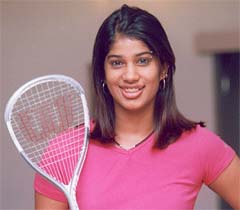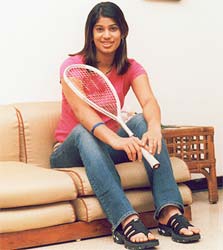Joshna Chinnappa, India's number one squash player, was seeded to win the just-concluded World Junior women's championship at Belgium. Surprisingly, she lost in the final to Raneem El Weleily.
Back in Chennai, 18-year-old national junior and senior champion, who retained her Asian junior title in January, spent time with Sports Correspondent Shobha Warrier to analyse her loss and her career.
 You were the top seed and expected to win at the World junior women's championship in Belgium...
You were the top seed and expected to win at the World junior women's championship in Belgium...
I wasn't looking forward to being the top seed as it puts a lot of pressure on you. But after a day or two, I forgot that I was the top seed.
How did the others look at you, the top seed?
I think the pressure was on them also. For example, if I am going to play a tournament, and if I have to face the top seed, I will be under tremendous pressure. You feel a kind of fear when you enter the court with the top seed.
What were your expectations from the tour?
My expectation was to play well and win. Definitely, everybody wants to win. And, when you are the top seed, they naturally expect you to be better than the rest, and win the title.
You played very well till the semis. What exactly happened at the final?
I was pretty cool till the final. I was calm and playing well, and enjoying myself but the pressure caught up with me at the final stage. The previous evening I had done a lot of press interviews and after that I started having negative thoughts. Though the press was very supportive, my mind started working differently.
I didn't really sleep the whole night. I might have slept only for an hour! My mind overworked. And when I reached the court I was so tense that I couldn't play my game.
So, when you analysed and talked a lot about the final, it affected you adversely.
Yes. Usually, I don't keep in touch with people or talk to the press during tournaments. I like to do that after the tournament ends. But this time I had to answer the calls because I didn't want to give the impression that I was arrogant or rude. After all, they [press] were happy for me, and very supportive. So I decided to take the calls, but it affected me adversely.
Hereafter, would you be talking only after a tournament ends?
It's nothing like that. But it has been a learning experience for me. I have learnt that you should not pressurise yourself before a big match.
It was mainly me against me. It was me with my thoughts who brought me down; it was nobody else's fault.
And my opponents played really well and capitalised on my faults.
Usually, how do you spend the night before a major match? How do you relax and keep yourself calm?
I watch TV, listen to music. The problem I faced in Belgium was I couldn't listen to my music because I didn't have the particular plug point to charge my ipod. And there was also no TV in the room. So I couldn't have any entertainment. I was in my room, reading magazines.
About the match. When did you realise that you were not playing up to your potential?
The minute I entered court I knew I was tense. From point one, I was not playing well. I just froze.
Mentally as well as physically?
Yes, both mentally and physically. I just couldn't move on the court. My coach gave me instructions but I did just the opposite. It was all my stupidity. My head was full of negative thoughts and I couldn't think clearly. I was just playing reactive squash; I wasn't playing my squash.
I was not attacking at all; I was just responding to whatever she [El Weleily] was hitting. I was playing to her hands. But in the third game I somehow got my act together and started playing well. I was up in that game (8-3) and I know that if I had won that game I would have turned the match in my favour. But I froze again, and she won that game too.
This is the first time that I had such an experience.
Did you feel very bad when she won the match?
I am a very, very sporting person. I take victory and loss in the same spirit. Of course, I am disappointed that I lost but I am not going to be sulking the whole time. Sure, I was upset but I was back to my normal self in a few minutes. I laughed and joked like I had not lost the match. I thought, 'good for her'. She played well.
I read that you ate a lot of chocolates that night. Was it to tide over the disappointment that you did that?
Yes, it was to help me emotionally. I ate a lot of chocolates as I hadn't had any chocolate for two months, and I am really addicted to them. I stopped eating chocolates as I wanted to concentrate on my game. If I eat too many chocolates, I start putting on weight. So, after the tournament, I went berserk.
Do you meditate?
I don't, but I know I should start practising, because it helps you remain cool and peaceful, stay calm and not over-excited.
 What are your plans for the future?
What are your plans for the future?
I will start playing a lot more senior events. I want to play the WISPA circuit. I am also focusing on the Asian Games.
I feel playing a lot of senior events helped my opponent at the world juniors. It makes you so much more mature, and it will also help you handle certain things on court. I know that once I start playing a lot of WISPA events, my game will mature.
Are you planning to go to Amsterdam and start training there?
Yes, from next year; after I finish my graduation I am planning to move there or keep going and coming.
How important is a training partner?
It is very important. I plan to train in Amsterdam with Liz Irwing. While in Chennai, I play alone. It gets lonely at times because you wish for someone to play with you. I do all my fitness training at Fitness One with a trainer called S Basu, who is with the Tamil Nadu cricket team.
You can't keep playing all alone all the time. You need people to hit with, and people to give you a good game. Male partners are good because they are much better than women in the game. They would give you a good game. I don't play with women players in India, but in Amsterdam I can do that because they are very competitive there.
As far as ranking goes, what is your immediate aim?
I am ranked 65 in the world, but I want to be in the top 20 or 30 by next year. It is tough for me to play a lot of tournaments as I have college as well. I want to play as many because I need to get more exposure.
And what about sponsors?
You need sponsors if you want to play many tournaments abroad. The government supports me a lot, to train in Amsterdam and live there. The coaching fee, the training fee, etc is very expensive. Whatever the government is doing is adequate right now but not for the future.
Do you feel sponsors are not willing to look beyond cricket?
I don't blame them if they want to put their money on cricket because that's where the money is. But I feel sponsors should put their money in a growing game like squash too. I am hopeful.
In India most sportspersons try to do a balancing act of academics and sports, while in many countries they concentrate only on sports. Is it not tough for you and many others in India to do both?
It is tough but I feel we have to have a balance of academics and sports. I feel we should pursue academics also as there is no permanency in sports. You could have an injury for life next day, and you wouldn't be able to play after that. Then, you need your education to support you in life. In that sense, education is very important. At the same time, sports shouldn't be neglected because of your studies. I think there should be a balance.
Photographs: Sreeram Selvaraj





